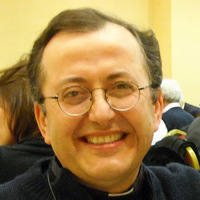Davide Righi
Facoltà Teologica dell'Emilia-Romagna, Storia della teologia, Faculty Member
... 亡刀みア口乃口刑づヒ乃あどアⅠ口づヒ口vピc 'Hあガ口Ⅰ一A口/i/y76乃口/-H方さzmアゐノ芭/刊Ⅰ 口Ⅰピ爪vピ門ざ820)PubⅡshedln1986,wlth rega丁dtothehlstonclけofthework)Marcuzz0states: Is the dialogue that we attribute to "Abraham of Tiberias with... more
... 亡刀みア口乃口刑づヒ乃あどアⅠ口づヒ口vピc 'Hあガ口Ⅰ一A口/i/y76乃口/-H方さzmアゐノ芭/刊Ⅰ 口Ⅰピ爪vピ門ざ820)PubⅡshedln1986,wlth rega丁dtothehlstonclけofthework)Marcuzz0states: Is the dialogue that we attribute to "Abraham of Tiberias with ' Abd al-Rahman ibn 'Abd ...
Research Interests:
The considerable theological heritage of the Arab Christian communities in the Middle East is still relatively little known outside of specalised circles, and the impression is still too common that "Arab" necessarily means... more
The considerable theological heritage of the Arab Christian communities in the Middle East is still relatively little known outside of specalised circles, and the impression is still too common that "Arab" necessarily means "Muslim." This artiche evokes the flourishing of Christian Arab thought and theology between the eighth and the thirteenth centuries, at a time when Christian Arab thinkers, theologians and pastors were striving to meet the intellectual and other challenges posed to their received faith by then victorious Islam, with which engagement was an existential imperative.
Research Interests:
The considerable theological heritage of the Arab Christian communities in the Middle East is still relatively little known outside of specalised circles, and the impression is still too common that "Arab" necessarily means... more
The considerable theological heritage of the Arab Christian communities in the Middle East is still relatively little known outside of specalised circles, and the impression is still too common that "Arab" necessarily means "Muslim." This artiche evokes the flourishing of Christian Arab thought and theology between the eighth and the thirteenth centuries, at a time when Christian Arab thinkers, theologians and pastors were striving to meet the intellectual and other challenges posed to their received faith by then victorious Islam, with which engagement was an existential imperative.
Research Interests:
L’articolo evidenzia gli ultimi cambiamenti del penultimo rituale delle esequie (2010) all’interno del percorso storico che dal XVI secolo arriva al concilio Vaticano II e che ha portato a comprendere il rito a) non piu come un “annesso”... more
L’articolo evidenzia gli ultimi cambiamenti del penultimo rituale delle esequie (2010) all’interno del percorso storico che dal XVI secolo arriva al concilio Vaticano II e che ha portato a comprendere il rito a) non piu come un “annesso” al sacramento dell’unzione del moriente, ma come un rito proprio compiuto per il fedele defunto, b) non piu come precipuo compito del presbitero, ma come compito della comunita cristiana chiamata, anche nel rito delle esequie, a celebrare la Pasqua del suo Signore; c) non piu in modo uniforme in tutto il mondo, ma delegando alle conferenze episcopali territoriali l’adattamento pastorale alle diverse lingue e culture. L’ultimo rituale invece e stato necessitato piu che da un cambiamento di paradigma ecclesiologico, da un cambiamento legislativo che va diffondendo sempre piu la consuetudine della cremazione.
... 亡刀みア口乃口刑づヒ乃あどアⅠ口づヒ口vピc 'Hあガ口Ⅰ一A口/i/y76乃口/-H方さzmアゐノ芭/刊Ⅰ 口Ⅰピ爪vピ門ざ820)PubⅡshedln1986,wlth rega丁dtothehlstonclけofthework)Marcuzz0states: Is the dialogue that we attribute to "Abraham of Tiberias with... more
... 亡刀みア口乃口刑づヒ乃あどアⅠ口づヒ口vピc 'Hあガ口Ⅰ一A口/i/y76乃口/-H方さzmアゐノ芭/刊Ⅰ 口Ⅰピ爪vピ門ざ820)PubⅡshedln1986,wlth rega丁dtothehlstonclけofthework)Marcuzz0states: Is the dialogue that we attribute to "Abraham of Tiberias with ' Abd al-Rahman ibn 'Abd ...
A small survey written in 2009 on the evolution of the «ordo missae» from the context of the 16th century until Council Vatican the 2nd and the following reform of the «ordo» by Pope Paul VI. The problems that followed the reform and the... more
A small survey written in 2009 on the evolution of the «ordo missae» from the context of the 16th century until Council Vatican the 2nd and the following reform of the «ordo» by Pope Paul VI. The problems that followed the reform and the problems raised by the reception of the «Summorum Pontificum» by Benedict 16th.
Research Interests:
Research Interests:
Research Interests:
Italian translation of the book by Roger ARNALDEZ, Jesus fils de Marie, prophète de l’Islam, ed. Desclee, Paris 1980
